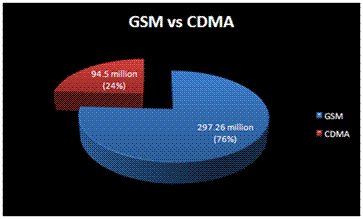The CDMA is based on spread spectrum technology which makes the optimal use of available bandwidth. It allows each user to transmit over the entire frequency spectrum all the time. On the other hand GSM operates on the wedge spectrum called a carrier. This carrier is divided into a number of time slots and each user is assigned a different time slot so that until the ongoing call is finished, no other subscriber can have access to this. GSM uses both Time Division Multiple Access (TDMA) and Frequency Division Multiple Access (FDMA) for user and cell separation. TDMA provides multiuser access by chopping up the channel into different time slices and FDMA provides multiuser access by separating the used frequencies.
2. Security
More security is provided in CDMA technology as compared with the GSM technology as encryption is inbuilt in the CDMA. A unique code is provided to every user and all the conversation between two users are encoded ensuring a greater level of security for CDMA users. The signal cannot be detected easily in CDMA as compared to the signals of GSM, which are concentrated in the narrow bandwidth. Therefore, the CDMA phone calls are more secure than the GSM calls. In terms of encryption the GSM technology has to be upgraded so as to make it operate more securely.
3. Spectrum Frequencies
The CDMA network operates in the frequency spectrum of CDMA 850 MHz and 1900 MHz while the GSM network operates in the frequency spectrum of GSM 850 MHz and 1900 MHz.
4. Global Reach
GSM is in use over 80% of the world’s mobile networks in over 210 countries as compared to CDMA. CDMA is almost exclusively used in United States and some parts of Canada and Japan. As the European Union permissions GSM use, so CDMA is not supported in Europe. In North America, especially in rural areas, more coverage is offered by CDMA as compared to GSM. As GSM is an international standard, so it’s better to use GSM in international roaming. GSM is in use by 76% of users as compared to CDMA which is in use by 24% users.

5. Data Transfer Rate
CDMA has faster data rate as compared to GSM as EVDO data transfer technology is used in CDMA which offers a maximum download speed of 2 mbps. EVDO ready mobile phones are required to use this technology. GSM uses EDGE data transfer technology that has a maximum download speed of 384 kbps which is slower as compared to CDMA. For browsing the web, to watch videos and to download music, CDMA is better choice as compared to GSM. So CDMA is known to cover more area with fewer towers.
6. Radiation Exposure
GSM phones emit continuous wave pulses, so there is a large need to reduce the exposures to electromagnetic fields focused on cell phones with “continuous wave pulses”. On the other hand CDMA cell phones do not produce these pulses. GSM phones emit about 28 times more radiation on average as compared to CDMA phones. Moreover, GSM phones are more biologically reactive as compared to CDMA.
Filed Under: How to


Questions related to this article?
👉Ask and discuss on Electro-Tech-Online.com and EDAboard.com forums.
Tell Us What You Think!!
You must be logged in to post a comment.